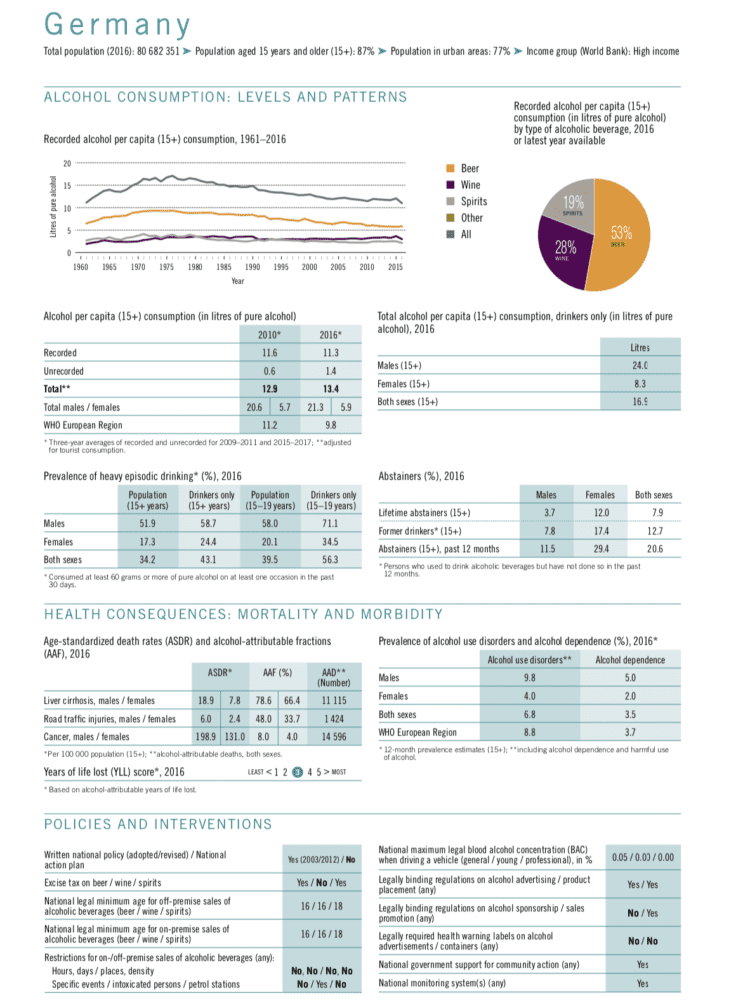Study: Germany Has an Alcohol Problem
Germany has an alcohol problem. The country remains one of the most-addicted societies in the world, according to a new study released by the German Central Office for Addiction Issues (Deutsche Hauptstelle für Suchtfragen, DHS). And alcohol addiction is not the only dimension of alcohol harm that is affecting people, families and society in Germany.
- Alcohol deaths: 74,000 people die every year due to alcohol in Germany.
- Alcohol poisoning: Approximately 21,700 children and youth between the age of 10 and 20 years were hospitalized due to alcohol poisoning, in 2017.
- Alcohol fueled crime: 231,300 crimes were committed by people under the influence of alcohol. That is 11% of all crimes committed in Germany for the year.
- Alcohol fuelled violence: 40,007 acts of violence were committed under the influence of alcohol in 2016. That is 27.3% of all solved cases in the area of violent crime.
- Alcohol-related road traffic crashes: 13.403 alcohol-related road traffic accidents occurred in 2016 where people got injured. In total 16,770 people got injured and 225 people died in alcohol-attributable crashes.
- Alcohol costs to society: The direct and indirect costs from alcohol-attributable disease amount to €40 billion every year.
These numbers are staggering and illustrate just how heavy the alcohol burden is on German society.
- Epidemic levels of alcohol deaths,
- Pervasive alcohol harm to others than the alcohol consumers themselves,
- Alcohol problems starting extremely early in life, and
- Alcohol problems affecting every aspect of German society;
Public health, the economy, youth protection, child rights, family well-being, transportation and road safety, public safety and sustainable development are all areas where alcohol adversely affects better policy outcomes as well livelihoods and real-life experiences of people and families.
Pervasive alcohol norm normalizes alcohol harm
The DHS study “Jahrbuch Sucht 2019” found that in 2017 Germans consumed some 131 liters of alcohol, roughly the capacity of a bath tub. This actually means a slight reduction of 2% less alcohol consumed. But Germany remains one of the countries in Europe with the highest rates of alcohol use – and Europe is the region in the world with the heaviest alcohol consumption. Almost 8 million Germans between the ages of 18 and 64 are heavy alcohol consumers.
To consume alcohol is considered totally normal in Germany,” says Christina Rummel, Deputy CEO of the DHS.
People in Germany are consuming on average as much alcohol as is contained in 700 bottles of beer. One reason: the low prices. This has led to a state where alcohol appears to be deeply ingrained in the fabric of German society, and all social and cultural events despite the fact that more than 20% of the adult population are not consuming any alcohol, in any given year.
Weak alcohol policy measures
In Germany, alcohol policy is being formulated to protect the interests of the alcohol industry, not to tackle the pervasive harm in the interest of society. The last attempts to comprehensively address Germany’s alcohol problem were derailed by the alcohol industry in 2009, when then Federal Commissioner for Drugs Mrs. Bätzing had proposed evidence-based and WHO-recommended alcohol policy measures. But the lobby interference of the alcohol industry and their allies in the conservative ruling party ultimately derailed the work that had progressed far.
Therefore, alcohol is becoming cheaper, relative to other costs. For example, prices for groceries and alcohol-free drinks have increased by 46% in the period between 1991 and 2017. Alcohol prices have only increased by 36.8%. Analysis of the last 40 years shows that alcohol has become cheaper by 30% relative to other costs. Consumer prices have decreased 38% for wine, 33% for liquor, and 26% for beer.
Alcohol industry is not paying for the costs of their products
For society this means a massive loss – every year. The German government receives an income from alcohol tax receipts of €3 billion. But this is dwarfed by the healthcare costs due to alcohol of about €40 billion. The alcohol industry is not paying its fair share of the costs that their products cause, but is taking home windfall profits.
As the latest country profile for Germany shows, alcohol use disorders are of epidemic proportions – with male disorders being higher than the average of the European region. The per capita alcohol consumption of alcohol users is worryingly high. Heavy episodic alcohol use of adolescents is another alarming problem, with more than half of 15 to 19-year olds engaging in binge alcohol use. And almost 15,000 cancer deaths are attributable to alcohol in Germany.
A list of horror
And yet, there is no national action plan for this urgent problem. There are no taxes on wine and taxation of beer and liquor remains inadequate. The legal minimum age remains below the global standard. Restrictions of the physical availability of alcohol are virtually non-existent, and alcohol marketing remains largely inadequate.
The German government is failing in all aspects of the most evidence-based, impactful and cost-effective alcohol policy measures. And it is failing its citizens suffering from the horrific alcohol harm.
https://movendi.ngo/the-issues/the-problem/aiap/alcohol-policy-best-buys/
To counter that trend, the authors of the “Jahrbuch Sucht 2019” study are calling on lawmakers to ban alcohol advertising, make alcohol more expensive, and raise the legal age for alcohol use to 18 – the so-called three best buys in alcohol policy.
—
For further reading:
*All facts can also be found here (in German)
Marian Blasberg, “Die Gesetzeshüter. Wie die deutschen Bierbrauer neue Gesetze gegen Alkoholmissbrauch verhindern und die Drogenbeauftragte der Bundesregierung entmachten,” Die Zeit, May 14, 2009
Daniel Drepper, Sanaz Saleh-Ebrahimi, “Wie die Alkoholindustrie uns dazu bringt, immer weiter zu trinken,” Correctiv, February 22, 2017

